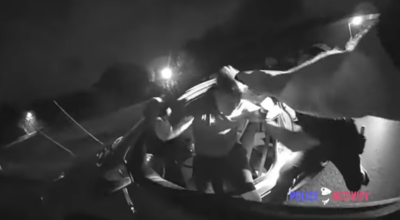


The arrest and criminal against another black ‘caught traveling” shows the dull evil of a system of city government accepted by the political classes, starting with Mayor Berke and extending to candidates to succeed in that office.
By David Tulis / NoogaRadio 92.7 FM
The seizure is that of Charlie Bell, a painter in a newly bought used car pulled over by a Chattanooga police officer enforcing the state shipping-trucking-hauling-transportation statute — routinely used against people not involved in the hauling trades because it is part of the state’s and city’s longstanding Jim Crow system.
Mr. Bell faces charges of “evading arrest” for pressing the gas pedal of his car and speeding away from the officer, who stood at the door of the car with his pistol drawn, according to Mr. Bell. Mr. Bell fled, though though the officer had, in his taxpayer-funded sedan equipped with blue lights, Mr. Bell’s driver license, and perhaps also the sales documents indicating Mr. Bell had just bought the car in which he sat.
Cop Joseph Ogg appears to dismiss the apparent grounds for the arrest — tag in the back window.
“I’m not worried about the tag,” he says. In the FB video, he appears to say something to the effect that car dealers often give buyers a makeshift tag, and that it happens all the time, and not to worry.
“I do have one question. Are you related to [name indistinguishable] from East Chatt?” The desire to ask a question is not probable cause for arrest in Tennessee.
Mr. Bell says no.
Officer J. Ogg, No. 904, speaks in a rapid clip and mumbles, “He used to run from me all the time.”
“You mind stepping out for me one second?”
“Stepping out? For what?” Mr. Bell says.
“I don’t have to tell you. I need you to get out of the car, OK?”
“I got you on camera.”
“OK. You can take that with you. You’re stepping out of the car, and pulling it out of the car.”
“For what?”
Officer Ogg draws his pistol, Mr. Bell says.
Officer’s voice rises to a shoat: “Step out of the car.”
“For what?”
Mr. Bell turns forward and engages the car’s engine.
“Get — hey. Get out of the fucking car,” the cop cries.
Mr. Bell steps on the gas and departs the seeming threat to his life.
Violation of Title 55
Title 55 is the commercial law that is compliant with the federal interstate commerce regulations at U.S.C. Title 49, transportation. It is the body of law that subjects shipper to police power without probable cause, police power that operates on the activity of commerce on the road.
Mr. Bell assures me in a phone interview that he is a painter who uses cars to get about to jobs and in which he carries his paint, brushes, rollers, tarps and other gear. He says he does not carry goods or people for hire. That means he has no need of a driver license in any way, because he is not subject to the privilege requirements upon all those who use the people’s road as their principal place of business.
Police and sheriff’s deputies routinely use the shipping law to lower the standard for probable cause to affect arrests. Every “traffic stop” is an arrest under State v. Gonzalez and State v. Garcia. An officer who makes a traffic arrest without probable cause is violating the law and opening himself to a tort civil action.

City government has not disputed Tennessee transportation administrative notice, under which it has been since Feb. 20, 2018, or 941 days. The constitution and the limited scope of Title 55 and Title 65 prohibit misuse of law to damage the people of Tennessee.
It makes clear that people have an absolute right of ingress and egress, of free movement by right on the people’s right of way, and that transportation, driving and operating a motor vehicle are separate from private travel by car.
The existence of notice adds tens of thousands of dollars of potential extra damages in lawsuits for abuse of Title 55 by city police and officers in Hamilton County, Red Bank, East Ridge and serving State of Tennessee. It’s evident that lawyers will not touch the notice in their dealings with potential clients; it was not prepared by a fellow guild member, and attacks the heart of their business model — the continuing injustice and abuse by the state, city and county of common people like Mr. Bell so there will be combustible fuel for future grievances and cases.
90 seconds of fear

From the Gonzalez case
Obviously, before the constitutional protections against unreasonable searches and seizures come into play, there must be a search or seizure. The Defendant here challenges the detention of Rayburn and himself in Rayburn’s vehicle as a violation of the Fourth Amendment; thus, as a preliminary matter, we must determine whether the Defendant was seized. It has been repeatedly held that the stop of an automobile and the detention of its occupants constitutes a seizure, even if the purpose of the stop is limited and the detention is brief. Whren v. United States, 517 U.S. 806, 809-10, 116 S.Ct. 1769, 135 L.Ed.2d 89 (1996); Delaware v. Prouse, 440 U.S. 648, 663, 99 S.Ct. 1391, 59 L.Ed.2d 660 (1979); United States v. Martinez-Fuerte, 428 U.S. 543, 556-58, 96 S.Ct. 3074, 49 L.Ed.2d 1116 (1976); State v. Vineyard, 958 S.W.2d 730, 734 (Tenn.1997). However, in this case, Officer Wright did not literally “stop” the vehicle in which the Defendant was riding. The vehicle had already come to a stop before Officer Wright had any contact with its occupants. This distinction is important because courts have also repeatedly held that an officer may approach an individual in a public place and ask questions without implicating constitutional protections, whether the individual is in a parked car or walking in a public place. See Florida v. Bostick, 501 U.S. 429, 434, 111 S.Ct. 2382, 115 L.Ed.2d 389 (1991); Florida v. Royer, 460 U.S. 491, 497, 103 S.Ct. 1319, 75 L.Ed.2d 229 (1983) (plurality opinion); State v. Daniel, 12 S.W.3d 420, 426 (Tenn.2000); State v. Pulley, 863 S.W.2d 29, 30 (Tenn.1993); State v. Wilhoit, 962 S.W.2d 482, 486 (Tenn.Crim.App.1997); State v. Butler, 795 S.W.2d 680, 685 (Tenn.Crim.App.1990). Such an occurrence is considered a “consensual” police-citizen encounter. See Bostick, 501 U.S. at 434, 111 S.Ct. 2382. The Supreme Court has explained the application and reasoning of this rule as follows:
[L]aw enforcement officers do not violate the Fourth Amendment by merely approaching an individual on the street or in another public place, by asking him if he is willing to answer some questions, by putting questions to him if the person is willing to listen, or by offering in evidence in a criminal prosecution his voluntary answers to such questions. Nor would the fact that the officer identifies himself as a police officer, without more, convert the encounter into a seizure requiring some level of objective justification. The person approached, however, need not answer any question put to him; indeed, he may decline to listen to the questions at all and may go on his way. He may not be detained even momentarily without reasonable, objective grounds for doing so; and his refusal to listen or answer does not, without more, furnish those grounds. If there is no detention-no seizure within the meaning of the Fourth Amendment-then no constitutional rights have been infringed.
Royer, 460 U.S. at 497-98, 103 S.Ct. 1319 (citations omitted); see also Daniel, 12 S.W.3d at 425.
Notwithstanding the right of a police officer to approach an individual in a public place, an encounter between an officer and a citizen will not be considered consensual and will instead be considered a seizure “when the officer, by means of physical force or show of authority, has in some way restrained the liberty of a citizen.” Terry v. Ohio, 392 U.S. 1, 19 n. 16, 88 S.Ct. 1868, 20 L.Ed.2d 889 (1968); see also Bostick, 501 U.S. at 434-35, 111 S.Ct. 2382. A seizure occurs “ ‘if, in view of all of the circumstances surrounding the incident, a reasonable person would have believed that he was not free to leave.’ ” Michigan v. Chesternut, 486 U.S. 567, 573, 108 S.Ct. 1975, 100 L.Ed.2d 565 (1988) (quoting United States v. Mendenhall, 446 U.S. 544, 554, 100 S.Ct. 1870, 64 L.Ed.2d 497 (1980) (opinion of Stewart, J.)); see also INS v. Delgado, 466 U.S. 210, 215, 104 S.Ct. 1758, 80 L.Ed.2d 247 (1984); Daniel, 12 S.W.3d at 425. “[I]n order to determine whether a particular encounter constitutes a seizure, a court must consider all the circumstances surrounding the encounter to determine whether the police conduct would have communicated to a reasonable person that the person was not free to decline the officer’s request or otherwise terminate the encounter.” Bostick, 501 U.S. at 439, 111 S.Ct. 2382. Some of the factors to consider include the time, place and purpose of the encounter; the words used by the officer; the officer’s tone of voice and general demeanor; the officer’s statements to others who were present during the encounter; the threatening presence of several officers; the display of a weapon by an officer; and the physical touching of the person of the citizen. Daniel, 12 S.W.3d at 425-26.


Looks like Ogg initiated a felony assault, as this situation also reminds me of one of my favorite Supreme Court cases.
The history of mankind will show that People may have not developed the skill of self-determination (American foundation), at all. Especially since there have always been other folks willing to tell them what to do, and that has been accepted, since a few believe that this takes them “off the hook” for self-determination.
It all reminds me of my favorite Supreme Court case, Yick Wo vs. Hopkins, Sheriff
Where the City (a piece of paper), apparently decided that all Laundries had to be built from stone or concrete, since wood can burn, and looked to have it’s hired thugs impose it on the folks doing Laundry for other folks in the city.
So, one of the chief Corporate Lackeys (the Sheriff) was ordered to send out some thugs (deputies) to impose the new “Rules/Edicts” upon all, within the Jurisdiction. They decided to first impose this edict from on high upon the Chinese laundry-man Yick Wo, at his Laundry built of wood.
So, upon arriving, and seeing a Chinaman right up front, they made demand for his name, and he told them 4 times. Then a violent ruckus broke out as the thugs commenced beating the man severely (to gain his compliance) when Yick Wo came out from the back yelling about who he was and as the owner of the joint, demanded to know what was going on.
He was promptly arrested, thrown in Jail, and fined $10. He had to go all the way to the Supreme Court to get Justice, and his $10 back, forcing the piece of paper to withdraw the edict as UN-Lawful, for all. Supporting his rightful determination.
History lost track of what happened to his faithful assistant, Fuk Yu.